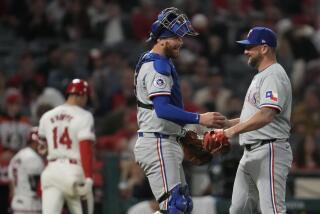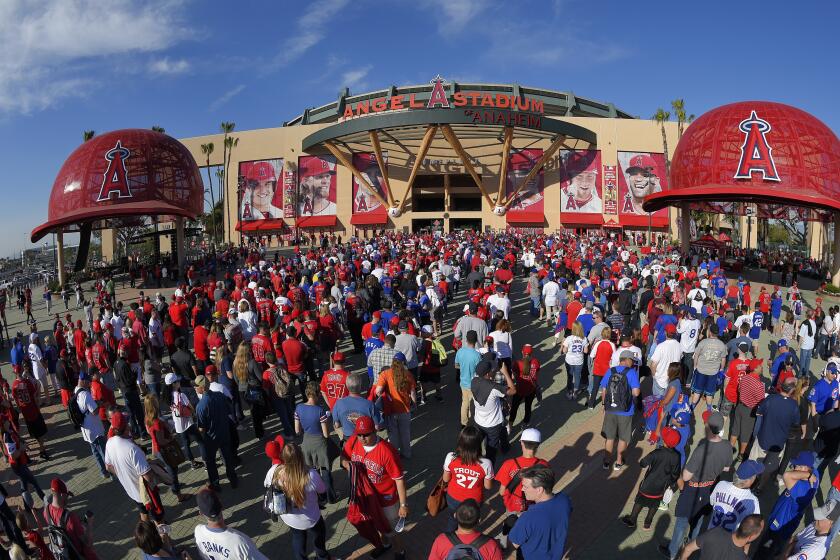FOUR KEY GAMES IN ANGEL DRIVE TO AL WEST TITLE : Winning a Fearsome Foursome Helped Angels Fly High
- Share via
One game does not a baseball season make, but a few of them say all one needs to know about the 1986 Angels, American League West champions for the third time in their history.
April 26, at Minnesota: Winds howl, rains crash, the Metrodome roof billows and tears, leaks sprout, 1,000-pound speakers dangle by thin cables--and the Twins lead after eight innings, 6-1. Angel Armageddon. But in the top of the ninth, George Hendrick hits a two-run homer. So does pinch-hitter Ruppert Jones. So does rookie Wally Joyner.
Angels win, 7-6.
May 26, at New York: The Angels have been mugged in the Bronx three straight days and take a five-game losing streak into Sunday afternoon. Mike Witt gives up three runs in the first inning and is down, 7-6, after eight. The Yankees send in Dave Righetti, baseball’s premier left-handed relief pitcher. The Angels send up Joyner, their left-handed kid first baseman. Joyner hits an 0-and-1 pitch by Righetti into the right-field seats with a man on base.
Angels win, 8-7.
June 16, Texas at Anaheim: Charlie Hough’s fickle knuckleball has the Angels swinging from their heels and falling on their faces. With one out in the bottom of the ninth, Hough still has a no-hitter.
Then, Jack Howell hits a fly ball that left fielder George Wright misplays into a three-base error. Joyner singles home Howell and moves to second base when a knuckler gets by catcher Orlando Mercado. Then, another knuckler and another passed ball. Hough forgets to cover home, and Joyner scores from second without a throw.
Angels win, 2-1.
Aug. 29, Detroit at Anaheim: The Angels come up for their final turn at bat behind, 12-5. They load the bases, and Howell doubles home two runs. Singles by Bobby Grich and Hendrick make it 12-9. Down to their final out, the Angels load the bases again.
Willie Hernandez, the Tigers’ Cy Young Award winner of 1984, is on the mound. Dick Schofield, the Angels’ light-hitting shortstop, is at the plate. For one split-second, however, credentials are forgotten. Hernandez hangs one, and Schofield hits a grand slam.
Angels win 13-12.
Those four games did more than highlight a season. They represented a trend that defined a season. Something strange, something totally beyond reason, was going on here.
Consider California Angel history. This was a team that couldn’t buy an ounce of good luck--although it often tried.
This was a team that spent millions on free agents in the winter, only to watch them suddenly turn 40 by summer.
This was a team that lost such young stars as Lyman Bostock, Minnie Rojas and Bobby Valentine to tragedy or injury in their athletic primes.
This was a team that blew a 2-0 series lead in the 1982 playoffs and a 6 1/2-game lead in the American League West in 1985.
For 25 years, the Angels seemed to be playing out a schedule stuck on Friday the 13th. The Big-A Hex, it was called.
But breaks, they say, even out in the end. Even for the Angels, who finally got some in 1986.
It was a weird year, but this franchise needed a dose of weirdness to squeeze 90 victories out of a season that began with little promise.
An old team had become a year older. Reggie Jackson was hitting 40 and Don Sutton was a year past it. At 35 and beyond were Doug DeCinces, Bobby Grich, Brian Downing, Bob Boone, Rick Burleson and George Hendrick.
The team’s top two hitters of the previous year, Rod Carew and Juan Beniquez, received handshakes and were shown the door.
The club’s supposed strength, the pitching staff, began April with John Candelaria and Gary Lucas on the disabled list, Donnie Moore headed there, Stewart Cliburn in Edmonton and no fifth starter in sight.
The Angels were headed south. Some preseason polls had them finishing last. In the same division as the reigning Kansas City Royals and the rising Oakland A’s, most figured the Angels somewhere around third or fourth.
Then, the unexpected happened.
Namely:
--Wally’s World: A rookie who looked like Wally Cleaver, or at least the clubhouse boy, turned out to be Roy Hobbs in kids’ clothing for six implausible weeks. Wally Joyner had not hit more than 12 home runs in any previous season in the minors, but in this season, his first in the majors, he had 16 by late May.
He hit home runs in the rain, home runs with the roof caving in, home runs in the ninth inning, home runs across America. He broke up no-hitters by Charlie Hough and Walt Terrell. He broke the Angel rookie record for most RBIs before the All-Star break.
In three months, Joyner went from the kid who replaced Carew to cult hero. Wally World T-shirts became baseball chic. There were appearances on the “Today Show” and “Dance Fever.” More significantly, there was an appearance in the All-Star game, Joyner becoming the first rookie ever to be voted into the starting lineup by the fans.
Injuries and expectations eventually wore him down, and Joyner faded in the second half. But for four months, his were the shoulders that carried a pennant contender.
--Goo Squad: Patchwork said it nicely when the Angels put Terry Forster, Doug Corbett and three rookies in the bullpen while Lucas’ back and Moore’s shoulder mended.
Forster had just been released by the Atlanta Braves. Corbett, since joining the Angels in 1982, had yet to spend an entire season in the major leagues. And T.R. Bryden, Todd Fischer and Chuck Finley were Angels only by way of necessity and force-feeding.
But Forster, the former “tub of goo” who discovered health food, and Corbett, who rediscovered his sinker, combined for 15 saves and 8 victories. Bryden and Fischer didn’t last long, but Finley developed into a capable middle reliever who gave Manager Gene Mauch an extra left-hander and drew surprising praise from Sutton. “A young Righetti,” Sutton called him.
Together, they held the bullpen together until the return of Moore and Lucas.
“That period was the key to our season,” Jones said.
--Arms Fare Well: Before 1986, Mike Witt was a 6-foot 7-inch mass of unfulfilled promise and Kirk McCaskill was a transplanted hockey player. Some doubted if Witt’s mental framework would ever catch up to his physical skills. Others wondered if McCaskill would ever fully make the transition from blue line to pitcher’s mound.
By late September, Witt had won 18 games and was drawing comparisons to Fernando Valenzuela and Roger Clemens. “The best pitcher in the game,” Jackson declared. “I’ve played with Catfish (Hunter) and (Mike) Guidry and (Jim) Palmer, and this year, Mike Witt has been as good as any of them.”
McCaskill, meanwhile, pitched a one-hitter and a pair of two-hitters on the way to 17 wins. Sutton, running his total to more than 300 victories, won 15. And Candelaria, since returning from the disabled list in early July, went 8-2.
They gave the traditionally pitching-thin Angels the best starting foursome in the league.
“Every time Witt, Candelaria, McCaskill and Sutton go out there, we think we’re going to win,” Mauch said.
--Codger Power: Sutton, who became the major leagues’ 19th 300-game winner in mid-June, led the way with 15 victories at the advanced age of 41. But there were other Angels who put the aging process into suspended animation.
DeCinces, 36, recovered from a first half of aches and pains and stranded baserunners, grabbed the baton from Joyner in August and kept the Angels running until they had blown open the West Division race. DeCinces hit nine home runs in August and now has 25 to go along with 93 RBIs.
Boone, 38, caught 140 more games and continued to make Mauch’s day by regularly throwing out base-runners.
Downing, 35, hit baseballs at a .270 clip, outfield walls at a slightly higher pace and can set a personal record for RBIs by driving in five more runs.
And then there was Grich, who, at 37 hit .290 in 300 at-bats. Are we still having fun? Grich said yes and is reconsidering retirement plans.
--Mauch, Too: Mauch’s silver anniversary season won’t win him any popularity awards among the Angels.
Jackson complained that Mauch was cramping his style by asking him to swing for singles. Moore complained of overwork. Burleson complained of too little work. DeCinces complained that Mauch was forcing him into becoming a platoon player.
But Mauch’s 25th season as a big league manager might win him something else. Maybe a pennant.
More to Read
Go beyond the scoreboard
Get the latest on L.A.'s teams in the daily Sports Report newsletter.
You may occasionally receive promotional content from the Los Angeles Times.







